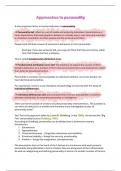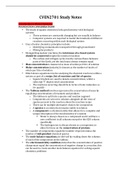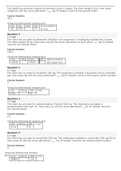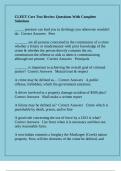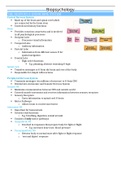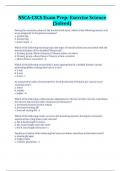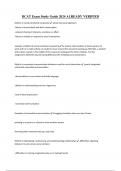Communication and Meds
What is communication? -
- includes verbal and non-verbal messages, must be purposeful and helps build
working relationships and meet human needs
What are the three levels of communication? -
Intrapersonal - within self (positive or negative)
Interpersonal - between two or more people
Group - with many people at once
What are the components of communication content? -
Subject, words, gestures, substance of the message, open to interpretation.
What are the components of communication process? -
Includes five parts - message, sender, receiver, channel and feedback. The active
part of communication
What is connotative meaning vs denotative meaning? -
A connotative meaning is one that is implied, a denotative meaning is one that is
factual
Name some factors that affect verbal communication (not therapeutic)? -
Vocabulary used, pacing of conversation, clarity, timing, credibility of speaker,
humor, relevance of information being given.
The nurse is teaching the client about his upcoming procedure and the client is very stressed.
What would it be most important for the nurse to do? -
Determine if the teaching should take place at a different time because clients who
are stressed may be unable to listen fully and will not receive/understand the intended
message.
What factors affect general communication situations? -
Environment, age, gender, culture, sociocultural factors, personal space
What do therapeutic relationships in health care do? -
Focus on improving the client's health, provide information about treatments, goal-
oriented, client-centered, and uses therapeutic techniques.
What phase of the therapeutic relationship is characterized by gathering information before
meeting the client? -
Phase 1 - Pre-Interaction phase
What phase of the therapeutic relationship is characterized by meeting clients, making
conversation, and establishing rapport? -
Phase 2 - Orientation phase
1|Page
,What phase of the therapeutic relationship is characterized using techniques related to
therapeutic communication and allowing the client to clarify any concerns? -
Phase 3 - Working phase
What phase of the therapeutic relationship is characterized by finding healthy ways to
conclude a relationship? -
Phase 4 - Termination phase
What are the phases of the therapeutic relationship? -
Pre-interaction phase, orientation phase, working phase, termination phase
Use of the statements "Tell me more about..." or "I see" encourage clients to continue talking
and expressing themselves is called what? -
Encouraging elaboration
What are the key characteristics of therapeutic communication (nurse's characteristics)? -
Concreteness, respect, genuineness, empathy, confrontation
What are some client factors that affect the use of therapeutic communication? -
Language barriers, impaired cognitive skills, sensory-perception issues.
If a client says that they are worried about a procedure and you as the nurse validate their
concerns as being normal, what key characteristic of therapeutic communication is the nurse
using? -
Respect
A nurse must show a sincere interest in the client and consistently show this. What key
characteristic of therapeutic communication is the nurse portraying? -
Genuineness
If a nurse makes sure to use clear and specific language when therapeutically communicating,
what key characteristic is the nurse using? -
Concreteness
Is asking a client "Why?" a good or bad communication technique? -
Bad, it is a barrier to communication
Is changing the subject quickly a good or bad communication technique? -
Bad, it is a barrier to communication
If a client states they are concerned about a procedure, what can the nurse do to ensure they
are not creating a barrier to communication? -
Ask open-ended questions, explore the issue in detail and avoid giving false
reassurance.
What is assessment? -
The systematic gathering of information related to the physical, mental, spiritual,
socioeconomic, and cultural status of an individual.
2|Page
, What is included in an assessment? -
Collecting data by using a systematic and ongoing process and then recording data.
What is the purpose of assessment? -
To plan for nursing care, to ensure clients receive the proper care by qualified
individuals at the time it is needed
A patient states, "Do you think I have cancer?" The nurse responds, "What did the doctor tell
you?" What interviewing approach did the nurse use?
1. Paraphrasing
2. Confrontation
3. Reflective Technique
4. Open-ended question -
4. The open-ended statement invites the patient to elaborate on the expressed
thoughts with more than just a one or two word answer.
The main purpose of the working phase of a therapeutic nurse-patient relationship is to:
1. Establish a formal or informal contract that addresses the patients problems
2. Implement nursing interventions designed to achieve expected patient outcomes.
3. Develop rapport and trust so the patient feels protected and an initial care plan can be
identified
4. Clearly identify the role of the nurse and establish parameters of the professional
relationship. -
2. During the working phase of the therapeutic relationship, nursing interventions
have a two fold purpose: assisting patients to explore and understand their thoughts and
feelings and supporting patient decisions and actions.
The nurse uses reflective technique when communicating with an anxious patient. The nurse
uses reflective technique in this situation because it focuses on:
1. Feelings
2. Content themes
3. Clarification of information
4. Summarization of the topics discussed -
1. The reflective technique requires active listening to identify the underlying
emotional concerns or feelings contained in a patient's messages. These feelings are then
referred back to the patients to promote a clearer understanding of what they have said.
A patient says, "I don't know if I'll make it through this surgery." Which response by the
nurse may block further communication by the patient?
1."You sound scared"
2."You think you will die"
3."Surgery can be frightening"
4."Everything will be alright" -
4. This response is false reassurance. It denies the patient's concerns about survival
and does not invite the patient to elaborate.
The patient states "My wife is going to be very upset that my prostate surgery probably is
going to leave me impotent." What is the best response by the nurse?
1.I'm sure your wife will be willing to make the sacrifice in exchange for your well-being
2.The doctors are getting great results with nerve-sparing surgery today.
3|Page


